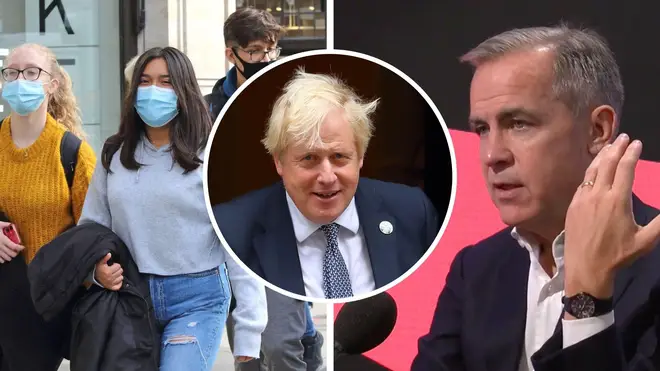
Clive Bull 1am - 4am
12 November 2021, 06:35 | Updated: 12 November 2021, 09:21

The UK has a "greater ability" to live with Covid compared to other countries, the former Bank of England chief has told LBC.
Mark Carney, who helmed the institution through Brexit and stepped down as the pandemic began, told the What Next? with Lionel Barber podcast that following a "Zero Covid" strategy will prove unviable.
He warned that if China, and other states that have spent the outbreak trying to clamp down on every single case, continue that approach then supply chain disruption could worsen.
Listen to What Next? with Lionel Barber on Global Player
Supporters of the approach believe it allows people to lead lives closer to before the outbreak, without the virus, while critics point to the stringent and often lengthy lockdowns that limit socialising and get implemented over a handful of cases.
In the UK, the vaccination rollout has given the Government confidence to largely unlock the economy and tolerate high case rates, hoping that jabs keep deaths and hospitalisations low.
Mr Carney, who has served as Boris Johnson's finance adviser for Cop26, said: "What we've seen in the UK and other countries is a greater ability to live with Covid.

What Next? Mark Carney on China's covid recovery issues if there’s a net zero approach
"So, even with spikes in the disease and hospitalisations - each of them a tragedy, but the ability for business to go on… is much, much better than it has been.
"So, the economic impact of the disease has lessened. It hasn't gone away.
“As you said at the outset, we're not yet in a post-Covid economy, but the impact is less.
"Unless you go to a zero Covid economy, because then you do need extreme measures of social distancing and other protections in order to be there and that's just very, very disruptive.
"And I personally think that China and others will have to evolve or pivot, depending on how you put it, towards managing Covid, helped by vaccinations, helped by boosters, potentially helped by improvements in therapeutics, which we're starting to see, in order to manage it.
"If they don't, if that's substantially delayed, then we will continue to have a series of disruptions in terms of supply chains, and those frictions and those inflationary pressures that come from it.
"And increasingly what will happen is, businesses will diversify supply chains or shift supply chains."

What Next? Mark Carney on the labour market post-Covid
Mr Carney added that with supply chain problems and potential labour market issues, economies are facing "inflationary pressures, but we're not slipping back in to a liquidity trap, which I was very worried about globally".
Besides China, countries such as New Zealand and Australia have sought to quash any outbreak of Covid with heavy restrictions.
Some called for a "zero Covid" strategy in the UK during the pandemic, arguing it to be superior to the Government's bid to live with coronavirus.
Mr Carney also said his successor as head of the Bank of England, Andrew Bailey, "got it right" in responding to the pandemic and its strain on the economy.
"I was there in the few weeks when it was obvious what was about to happen, and the broad direction of policy was set, and obviously Andrew Bailey and I worked closely, given that he was going to have to live with whatever decisions were taken.
"And, independently but consistently, it was clear that the Chancellor and the Government needed to spend and support people and businesses to try to bridge them and that the Bank, in terms of its choices, was going to need to also support the economy at some scale.
"Now, Andrew and his colleagues on the MPC [Monetary Policy Committee] and others across the bank decided what scale that was and, and got it right in my view, and the Chancellor… when we were talking about it in the first few weeks of March, the orders of magnitude, we were thinking in terms of six months' bridge, that was the best advice we were getting in terms of the health emergency.
"Of course it turned out to be an 18 month bridge and substantially more expensive. Directionally I'm sure that the same decisions would have been taken, but the orders of magnitude are remarkable."